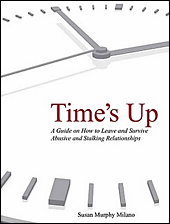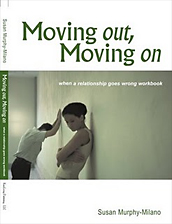Women tell me other therapists have diagnosed them with a variety of diagnosis which has made the women not only confused, but often MAD! They have been diagnosed, for instance with disorders like Bipolar, Borderline Personality Disorder, Paranoia, and other not-so-fun labels.
We recognize that this happens a lot which is why we have instituted a therapist training program so that the therapists can understand what they are seeing in context to what you have experienced. (Therapist trainings are Nov 2010 in LA and January 2011 in FL).
To come to bat for the under-trained therapists, the reason you are being diagnosed with various disorders is because your symptoms are similar to various disorders–they are mimicking true mental health symptoms.
For instance, when your moods are swinging all over the place and you are depressed and anxious, you look Bipolar. When you are cranky, highly reactive and want vengeance you look Borderline. When you are scared about what he will do next, fear you’re being followed, or afraid he is sneaking around to see you do something so he can accuse you, you look paranoid. When you think things are happening that you can’t prove to other people, you look delusional.
The issue is, these are ALL normal reactions to what is called Coercion, Stockholm Syndrome, and your basic prisoners of war, or in other words Aftermath of Pathological Love Relationship. In THAT context, your symptoms make perfect sense! You were coerced, your mind was played with, and you felt stuck and held in a pathological relationship against your own spiritual will. You did fear that your emotional and/or physical existence was in jeopardy. And the pathological DOES do things he never gets caught for and that you can’t prove.
In pathological relationships, women emerge with signs of PTSD, Stockholm Syndrome, and Coercion. Unfortunately, not all therapists understand the overlap between PTSD, Stockholm and Coercion–which is why you are often diagnosed ‘other things.’
The symptoms of Stockholm are:
- Perceived threat to one’s physical or psychological survival and the belief that the captor would carry out the threat.
- Perceived small kindnesses from the captor to the captive.
- Isolation from perspectives other than those of the captor.
- Perceived inability to escape.
(My note: A lot of this was also discussed in the book ‘Women Who Love Psychopaths’ in which I talked about the Pathological World View and how you acquired HIS view of the world and how that entrapped you in the relationship).
In Coercion, these symptoms are:
- Isolation: Deprives individual of social support, effectively rendering her unable to resist.
- Makes individual dependent upon interrogator/captor.
- Victim then develops an intense concern with self.
(My note: This too is discussed in the ‘Women Who Love Psychopaths’ book during the Honeymoon and Luring Stages of the relationship).
Monopolization of Perception: The captor fixes their attention upon immediate predicament; fosters introspection in the victim; eliminates outside competing stimuli with the captor so the victim can only focus on him, he frustrates all actions not consistent with her compliance to him.
(My note: In the mid-relationship dynamics in the book, this is talked about. Your Super Traits are very high in what we call relationship investment and cooperation which means you are highly cooperative because you get so much enjoyment out of your relationships that you will ‘bend over backwards’ to make things work. The book discusses when the mid-relationships ‘shift’ and what happens to the woman’s perspective).
Induced Debility and Exhaustion: People subjected to this type of abuse become worn out by tension, fear and continual rushing about in an effort to meet his standards. They must often avoid displays of fear, sorrow or rage, since these may result in ridicule or punishment. Rigid demands and requirements make the exhaustion and ability to resist even worse.
(My note: All the women who show up at the retreats show up in bodily exhaustion. This too is discussed in the book).
Occasional Indulgences: This provides motivation to her for compliance.
(My note: The TCI test we gave the women show that you test very high in compliance).
Devaluing the Individual: Creates in her a fear of freedom and dependence upon him; creates feelings of helplessness; develops lack of faith in her individual capabilities.
(My note: In the book, women who are doctors can’t remember how to care for themselves, women who are attorneys can’t remember how to file their own restraining order, women who are therapists can’t remember why this is sick behavior….)
When you look at it through the eyes of a mixture of PTSD, Stockholm and Coercion your symptoms make perfect sense…at least to me! While that doesn’t mean you ‘can’t’ also have Bipolar or other disorders—it’s too early to know. Very often much of the symptoms of other disorders fall by the wayside when effective and appropriate treatment is begun. Many of the women do, however, meet the criteria for PTSD. PTSD is most associated with war vets (and yes, you too lived through a war!) and trauma victims (yes, you were traumatized)! To that end, you probably do have a disorder but it is related to PTSD or other Acute Stress Disorders.
Our hope is that as we train more therapists we will help you most by making available effective and knowledgeable help for what you have lived through and stop the erroneous diagnosing so often associated with you and your symptoms.
For now though, if you cannot locate a therapist, we do offer phone sessions, telesupport groups, Retreats, and one last 1:1 Intensive Sessions with Sandra.
Be hopeful that what you live with today in symptoms may not always be as problematic as it is in your current life. There is hope and healing available!









